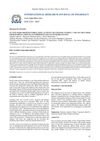 July 2024 in “International Journal of Ayurvedic Medicine”
July 2024 in “International Journal of Ayurvedic Medicine” Certain compounds from Kushtakudori ennai may help treat hair loss.
 November 2017 in “Asian journal of pharmaceutical and clinical research”
November 2017 in “Asian journal of pharmaceutical and clinical research” Three compounds from Dadap leaves may help treat hair loss.
 2 citations,
January 2022 in “Rasayan journal of Chemistry”
2 citations,
January 2022 in “Rasayan journal of Chemistry” Compounds from the Sansevieria trifasciata plant might be effective for treating hair loss.
November 2022 in “International Journal of Applied Pharmaceutics” Ergostadienol from Moringa seed oil may help prevent hair loss.
 7 citations,
April 2021 in “Journal of advanced pharmaceutical technology & research”
7 citations,
April 2021 in “Journal of advanced pharmaceutical technology & research” The compound 16 from the Merremia peltata plant could potentially be a good treatment for hair loss (alopecia) due to its strong activity and favorable skin absorption.
 59 citations,
May 2014 in “Expert Opinion on Therapeutic Targets”
59 citations,
May 2014 in “Expert Opinion on Therapeutic Targets” The document concludes that targeting 5α-reductase, the androgen receptor, and hair growth genes, along with using compounds with anti-androgenic properties, could lead to more effective hair loss treatments.
 2 citations,
April 2023 in “Pharmaceuticals”
2 citations,
April 2023 in “Pharmaceuticals” Scopolin and scopoletin from Merremia peltata leaves may help treat hair loss and showed promising results in rabbit tests.
4 citations,
January 2018 in “Research journal of pharmacy and technology” Wera leaf extract can help with hair growth.
 1 citations,
December 2022 in “Pharmaceuticals”
1 citations,
December 2022 in “Pharmaceuticals” Noni fruit extract, specifically the FEA-3 sub-fraction, can increase hair growth and reduce baldness in male rabbits, potentially acting like common hair loss treatments.
 December 2024 in “Tropical Journal of Natural Product Research”
December 2024 in “Tropical Journal of Natural Product Research” Parsley leaf fractions may help treat and prevent hair loss.
June 2024 in “Deleted Journal” Herbal plants may help treat hair loss with fewer side effects than synthetic drugs.
 May 2022 in “Pharmacognosy journal”
May 2022 in “Pharmacognosy journal” Moringa seed oil may help prevent hair loss and promote hair growth.
July 2024 in “European Journal of Medicinal Chemistry” New small molecule drugs could help treat hair loss.
 5 citations,
February 2022 in “Acta Biomaterialia”
5 citations,
February 2022 in “Acta Biomaterialia” Nanomaterials can improve hair care products and treatments, including hair loss and alopecia, by enhancing stability and safety, and allowing controlled release of compounds, but their safety in cosmetics needs more understanding.
 7 citations,
July 2018 in “Biological & Pharmaceutical Bulletin”
7 citations,
July 2018 in “Biological & Pharmaceutical Bulletin” Phyllanthus urinaria extract may help treat hair loss by blocking a hair-related enzyme.
 4 citations,
August 2022 in “The Scientific World Journal”
4 citations,
August 2022 in “The Scientific World Journal” Merremia peltata leaf extract, particularly the bufotalinin compound, shows potential for treating hair loss.
 July 2023 in “Pharmacognosy Magazine”
July 2023 in “Pharmacognosy Magazine” Cerasus serrulata flower extracts have strong antibacterial and antioxidant effects and may help prevent hair loss.
 1 citations,
October 2018 in “International research journal of pharmacy”
1 citations,
October 2018 in “International research journal of pharmacy” Rampai leaves extract can significantly stimulate hair growth.
 18 citations,
January 1998 in “Endocrine”
18 citations,
January 1998 in “Endocrine” RU58841, a nonsteroidal anti-androgen, showed potential as a topical treatment for hair loss, increasing hair density, thickness, and length without systemic side effects in Stumptailed Macaques.
 December 2023 in “International Journal of Applied Pharmaceutics”
December 2023 in “International Journal of Applied Pharmaceutics” Moringa seed oil helped hair growth in rabbits, with the highest dose being most effective.
 2 citations,
June 2022 in “Molecules”
2 citations,
June 2022 in “Molecules” Connarus semidecandrus Jack extract promotes hair growth and thickness, reduces prostate cancer cell growth, and could potentially be used as a treatment for hair loss.
3 citations,
March 2022 in “Research journal of pharmacy and technology” Parsley contains compounds that might be good for treating hair loss.
 2 citations,
January 2013 in “Advances in Experimental Medicine and Biology”
2 citations,
January 2013 in “Advances in Experimental Medicine and Biology” Taurine might help prevent hair loss caused by stress.
 5 citations,
July 2003 in “Drug Development Research”
5 citations,
July 2003 in “Drug Development Research” Fluridil promotes hair growth safely and effectively for androgenetic alopecia.
 14 citations,
January 2019 in “Journal of Natural Medicines”
14 citations,
January 2019 in “Journal of Natural Medicines” Chaga mushrooms contain compounds that may promote hair growth better than common treatments.

Hair RiseTM microemulsion effectively promotes hair growth and treats hair loss better than standard treatments.
 125 citations,
May 2019 in “Phytomedicine”
125 citations,
May 2019 in “Phytomedicine” Cepharanthine is a well-tolerated drug with multiple medical uses, including anti-inflammatory and anti-cancer properties.
 23 citations,
November 2015 in “Phytotherapy Research”
23 citations,
November 2015 in “Phytotherapy Research” Certain herbal compounds, especially from bitter melon, can inhibit cancer growth and promote hair growth by blocking PAK1.
 July 2023 in “International Journal of Molecular Sciences”
July 2023 in “International Journal of Molecular Sciences” N,N-Dimethylglycine Sodium Salt helps reduce skin inflammation and improves skin cell growth and healing.
 4 citations,
January 2018 in “Cosmetics”
4 citations,
January 2018 in “Cosmetics” Spin traps like PBN could protect skin from pollution and sunlight in cosmetics but need more research for safe use.

























